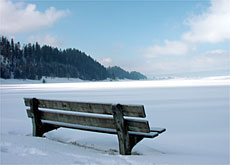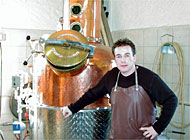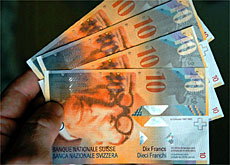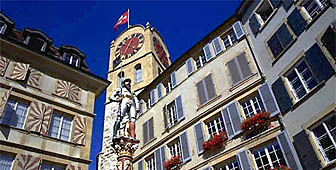Swiss Siberia offers a warm welcome

Tuesday night was the coldest this winter in Switzerland with temperatures falling to minus 15 degrees Celsius in the plains, and minus 25 degrees in a place justifiably known as the “Swiss Siberia”.
The frigid reputation of La Brévine in the Jura hills may scare many away, but visitors willing to brave the cold receive a warm welcome.
In his La Brévine apartment, pensioner Marcel Blondeau spreads out a piece of paper on the dining room table on which he has jotted down a few of the record lows set in the village.
“My record is minus 41 degrees, which I recorded at 8 o’clock in the morning on January 2, 1987,” Blondeau says proudly, tapping the line in question with his index finger.
He says that temperature was only one degree warmer than the Swiss record low registered in La Brévine a few decades before he and his wife began dutifully registering temperatures for the Swiss Meteorological Institute.
Microclimate
The village lies at the heart of a 27-kilometre-long valley basin, framed at the edges by tall fir trees under crystal clear blue skies.
The topography is largely responsible for the microclimate here, but it’s not so much the cold that draws people to La Brévine as the snow.
They come to cross-country ski along trails crossing a valley that is probably closer to a Siberian landscape than any region in Switzerland.
It may lack the dramatic scenery of the Alps, but La Brévine and its valley have charm, giving off an air of serene beauty and melancholy.
The valley at this time of year is deadly quiet and the village sleepy, to say the least.
No longer thriving
Many residents have left over the past few decades to work in the watchmaking factories of nearby towns and have not returned, leaving La Brévine’s population decimated.
What was once a thriving community of 2,000 has been reduced to about 600.
A couple of hotel-restaurants have survived in the village square and there are enough cross-country skiers to support La Brévine’s tiny sports shop, appropriately named Siberia Sport.
“People don’t necessarily come here because it’s so cold,” says the shop’s owner Jacqueline Schneider. “Only when newspaper articles appear about La Brévine, as has been the case lately.”
Weather station
With the exception of Siberia Sport, La Brévine does not market its unusual attribute.
There are no other Siberia signposts or markers leading the way to the weather station where the record temperatures have been recorded.
We require the services of Blondeau to find the simple three-armed contraption hidden in a hollow behind the village square.
But Blondeau does not come here very often anymore since the Swiss weather service replaced a manual apparatus with this automatic device in 1997.
“We used to have to take measurements three times a day, every day,” he says. “At seven o’clock in the morning, one o’clock in the afternoon and again in the evening.
“We also read the clouds, measured the snow depth and amount of new snow and the humidity. We had to do all this three times a day!”
Automated
The machine begins to hum quietly. Blondeau says it is at work, recording the temperature and sending the information directly to the weather office’s Zurich headquarters.
“Every 30 seconds,” he says. “Every 30 seconds!”
This week’s low of minus 25 was one of the coldest recorded anywhere in Switzerland this winter, almost twice as cold as it was at the same time at the top of the Jungfraujoch, about 2,500 metres higher than La Brévine.
We finally decide to come in from the cold for a coffee in the Hôtel de Ville restaurant where we get an unbelievably warm welcome.
Each of the three staff on duty takes time to come to our table and shake our hands, and we are told this kind of reception is normal here.
The price is inviting as well – at SFr2.80 a cup, the coffee is about a franc cheaper than in most Swiss towns, cities or resorts.
Jean-Daniel Oppliger, owner-manager of the neighbouring Auberge au Loup Blanc (White Wolf Inn), also has the right idea.
Open fire
He has renovated his establishment while managing to maintain its rustic character.
The open fire in the corner is not roaring but adds warmth to the place’s ambience, and Oppliger cooks – or melts – our main course by placing it at the edge of the flames.
“The Vacherin Mont d’Or cheese is a Jura specialty,” Oppliger says as he stokes the fire.
“We make this cheese only in winter,” he adds, pouring the melted contents over a plate of steaming potatoes.
Winter, it seems, does have its charms – even in the Swiss Siberia.
swissinfo, Dale Bechtel in La Brévine
La Brévine lies at 1,000 metres above sea level in the Jura hills in canton Neuchâtel.
It is considered the coldest inhabited place in Switzerland, where temperatures of minus 42 degrees Celsius have been recorded.
The coldest temperature ever recorded outside Antarctica was minus 68 degrees Celsius in Siberia.
La Brévine is the centre of the valley’s cross-country ski trails.
The reason for the extreme cold winters in La Brévine, according to La Brévine’s amateur weatherman, Marcel Blondeau:
“The valley is shaped like a big basin, which traps the cold.
“There has to be a minimum of 50 centimetres of snow to take the temperature down to minus 30 or 40 degrees celsius.
“Temperatures fall continuosly during the night, and in the morning the rising sun pushes all the cold air into the valley.”
Blondeau remembers that in 1985, temperatures remained between minus 39 and minus 41 degrees Celsius for a whole week.

In compliance with the JTI standards
More: SWI swissinfo.ch certified by the Journalism Trust Initiative




You can find an overview of ongoing debates with our journalists here . Please join us!
If you want to start a conversation about a topic raised in this article or want to report factual errors, email us at english@swissinfo.ch.